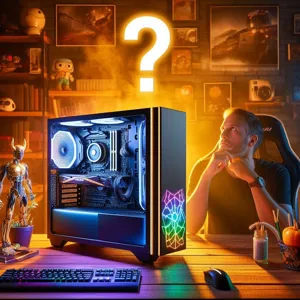In the ever-evolving world of gaming, the battle between building your own gaming PC and buying a pre-built one has become a pivotal decision for enthusiasts and casual gamers alike.
Each option presents its own unique set of advantages and challenges, making the choice not just a matter of preference, but a strategic move that can impact your gaming experience for years to come. Are you a tech-savvy individual who revels in the thrill of assembling the perfect machine tailored to your specifications, or would you prefer the convenience of a ready-to-go system that promises reliability and performance? In this ultimate guide, we will delve deep into the pros and cons of both approaches, providing you with invaluable insights, expert tips, and essential considerations to help you make an informed decision. Whether you’re aiming for cutting-edge graphics, stellar processing power, or simply seeking the best value for your hard-earned money, this guide will illuminate the path to your perfect gaming setup. Get ready to level up your gaming experience!
1. Introduction: The Build vs. Buy Debate

In the world of gaming, your choice of hardware can significantly impact your experience, performance, and overall enjoyment. As you embark on your journey to acquire the perfect gaming PC, you’ll inevitably encounter the age-old debate: should you build your own rig or buy a pre-built system? This decision is more than just a matter of convenience; it’s about understanding your personal preferences, technical skills, and gaming aspirations.
Building your own gaming PC allows for unparalleled customization and the chance to curate every component to fit your specific needs. From selecting the ideal graphics card to choosing the right cooling system, the ability to handpick each part means you can tailor your machine for optimal performance in the latest games. For the DIY enthusiasts, this route offers a rewarding challenge that not only enhances your technical knowledge but also gives you a sense of pride in your creation.
On the other hand, buying a pre-built gaming PC provides a hassle-free solution, particularly for those who may not have the time or expertise to assemble a rig from scratch. With a pre-built system, you can enjoy the instant gratification of gaming right out of the box, often with warranties and customer support included. This option can be particularly appealing for newcomers to the gaming world who might feel overwhelmed by the myriad of components and configurations available.
As we dive deeper into this guide, we’ll explore the pros and cons of each approach, helping you weigh the benefits of customization against the convenience of ready-made solutions. Whether you’re a seasoned gamer looking to push the limits of your setup or a casual player seeking simplicity, understanding the nuances of the build vs. buy debate is crucial to making an informed decision that aligns with your gaming goals. Get ready to embark on a journey that will not only elevate your gaming experience but also empower you with the knowledge to choose the perfect gaming PC for your needs.
2. Understanding Your Gaming Needs
When it comes to choosing the perfect gaming PC, understanding your gaming needs is paramount. Not every gamer is the same; your preferences, gaming habits, and even your future aspirations can significantly influence your decision to build or buy.
First, consider the types of games you enjoy playing. Are you an avid fan of fast-paced first-person shooters that require high frame rates and rapid response times? Or do you prefer immersive role-playing games with expansive worlds and intricate graphics? Knowing the genre and specific titles you want to play will help you pinpoint the necessary hardware specifications. For example, a gaming PC tailored for competitive esports might prioritize a powerful graphics card and a high-refresh-rate monitor, while a system designed for open-world adventures might focus on a balanced performance between CPU and GPU to handle complex environments.
Next, evaluate the level of performance you desire. Are you looking to play games at 1080p, 1440p, or even 4K resolution? Higher resolutions demand more robust hardware. Additionally, consider your expectations for frame rates—do you want a buttery smooth 60 FPS, or are you aiming for 144 FPS or more for competitive edge? Understanding these aspects will not only guide your hardware choices but also help you determine whether building a custom rig or purchasing a pre-built system is more suitable for your needs.
Don’t forget about future-proofing your setup. The gaming landscape is constantly evolving, with new titles regularly pushing the limits of technology. If you plan to keep your gaming PC for several years, investing in slightly higher specifications now could save you from needing an upgrade sooner than expected.
Lastly, consider your gaming lifestyle. Will you be taking your PC to LAN parties, or will it be a stationary setup in your home? Portability may sway you toward a compact pre-built system or a custom build that prioritizes lightweight components.
By taking the time to understand your gaming needs, you’ll make a more informed decision, ensuring that your investment in a gaming PC—be it built or bought—aligns perfectly with your gaming aspirations. This clarity will enhance your gaming experience, allowing you to dive into virtual worlds with confidence and excitement.
3. Advantages of Building Your Own Gaming PC

Building your own gaming PC may seem like a daunting task at first, but the advantages it offers can make the effort well worth it. One of the most compelling benefits is customization. When you build your gaming rig, you have complete control over every component, allowing you to tailor the system to your specific gaming needs and preferences. Want the latest graphics card that delivers jaw-dropping visuals? Or perhaps you desire a high-speed SSD to minimize load times? With a custom build, the choices are entirely yours, ensuring that you get the best performance possible for the games you love.
Another significant advantage is cost-effectiveness. While pre-built gaming PCs can often come with a hefty price tag due to labor and brand markups, building your own can save you a substantial amount of money. By sourcing parts individually, you can shop around for the best deals and even opt for refurbished components without sacrificing quality. This approach not only stretches your budget further but also allows you to invest in higher-quality parts where it matters most.
Moreover, building your own gaming PC grants you a deeper understanding of how your system works. This knowledge is invaluable when it comes time for upgrades or troubleshooting. You’ll quickly learn how to swap out components, optimize settings, and diagnose issues, giving you the confidence to maintain and enhance your rig over time. This hands-on experience can be incredibly rewarding, transforming not just how you game, but how you perceive technology as a whole.
Lastly, there’s a unique sense of satisfaction that comes from assembling your own gaming PC. The pride of seeing your creation come to life, knowing that every component was chosen with care and precision, enhances your gaming experience. You’re not just playing games; you’re experiencing the culmination of your hard work and creativity. In a world where gaming can often feel impersonal, this connection to your machine can make all the difference. Whether you’re a casual gamer or a competitive player, building your own gaming PC is a fantastic way to ensure you have a system that truly reflects your style and needs.
4. Disadvantages of Building Your Own Gaming PC
While building your own gaming PC can be an exciting and rewarding venture, it’s essential to weigh the disadvantages that come with this choice. One of the most significant drawbacks is the time commitment involved in the entire process. From researching and selecting compatible components to assembling everything and troubleshooting potential issues, building a gaming PC can take hours, if not days. For those with busy schedules or limited technical knowledge, this can feel overwhelming and frustrating.
Additionally, there’s a steep learning curve for novice builders. Without prior experience, navigating the intricacies of hardware compatibility, installation procedures, and system optimization can be daunting. Mistakes can lead to costly damages or poor performance, which can discourage even the most determined enthusiasts.
Another consideration is the warranty and support aspect. When you build your own PC, individual components typically come with their own warranties, which means that if something goes wrong, you may have to diagnose the problem yourself and deal with each manufacturer separately. In contrast, pre-built systems usually come with a comprehensive warranty and customer support, streamlining the process of dealing with any issues that may arise.
Moreover, the initial costs might not always be lower than expected. While building a gaming PC can offer the allure of customizability, you may find that the total expense of purchasing high-quality components can rival or even exceed that of a pre-built system. Add in the potential for unforeseen costs, such as cooling solutions or additional peripherals, and your budget might start to balloon.
Lastly, there’s the risk of missing out on the latest technology. The gaming industry evolves rapidly, with new components and technologies being released regularly. If you take too long to build your PC, you might end up with outdated hardware by the time you’re ready to play. For gamers craving immediate access to cutting-edge performance, waiting to assemble your system might feel like a disadvantage that could cost you precious gaming time.
Ultimately, while building your own gaming PC can be a fulfilling project, it’s crucial to consider these disadvantages carefully before taking the plunge. Balancing the potential drawbacks with your personal skills, time availability, and gaming needs will help you make an informed decision that aligns with your gaming aspirations.
5. Advantages of Buying a Pre-Built Gaming PC

When it comes to the age-old debate of build versus buy, opting for a pre-built gaming PC can offer a plethora of advantages, especially for those who may not be tech-savvy or simply want to dive into gaming without the hassle of assembling components. Here are some compelling reasons why buying a pre-built gaming PC might be the right choice for you.
**1. Convenience and Time-Saving:** One of the most significant advantages of purchasing a pre-built gaming PC is the convenience it offers. With a pre-built system, you can skip the often daunting task of researching individual components, compatibility checks, and assembly. Instead, you can simply pick a model that suits your gaming needs and have it delivered straight to your door, ready to plug in and play. This saves you valuable time and allows you to jump into your favorite games without delay.
**2. Expert Assembly and Quality Assurance:** Pre-built gaming PCs are typically assembled by experienced professionals who ensure that all components are properly installed and configured. This means you can have peace of mind knowing that your system has undergone rigorous quality checks before it reaches you. Many reputable manufacturers also offer warranties and support services, giving you additional security against potential issues down the line.
**3. Optimized Performance:** Pre-built gaming PCs are often designed with optimal performance in mind. Manufacturers take the time to match components that work harmoniously together, ensuring that you get the most out of your hardware. They also pre-install drivers and necessary software, so you don’t have to worry about compatibility issues or performance bottlenecks. This level of optimization can enhance your gaming experience, allowing you to focus on gameplay rather than technical hurdles.
**4. Aesthetics and Customization Options:** Many pre-built gaming PCs come with stylish designs and customizable RGB lighting options, allowing you to choose a system that fits your personal aesthetic. Some brands even offer customizable configurations, so you can select the specifications that meet your performance needs while still enjoying the convenience of a pre-built system.
**5. Immediate Availability of Components:** In the current market, finding specific components can be a challenge due to shortages and high demand. By purchasing a pre-built gaming PC, you gain immediate access to a complete system without the stress of hunting down individual parts. This is especially beneficial if you’re eager to start gaming right away.
In summary, buying a pre-built gaming PC can be a fantastic choice for those looking for convenience, reliability, and optimized performance without the hassle of building their own system. Whether you’re a casual gamer or a dedicated enthusiast, a pre-built option can provide an excellent gaming experience right out of the box.
6. Disadvantages of Buying a Pre-Built Gaming PC
When considering the purchase of a pre-built gaming PC, it’s essential to weigh the disadvantages alongside the convenience it offers. While pre-built systems may seem like a hassle-free option, they come with certain drawbacks that could impact your gaming experience.
One of the most significant disadvantages is the cost. Pre-built gaming PCs often carry a premium price tag compared to their custom-built counterparts. This is partly due to the markup associated with assembling the system, as well as the inclusion of brand-name components that may not always deliver the best performance for your budget. You might find that you can get superior hardware if you opt to build your own, allowing for more flexibility in allocating your budget to key components like the graphics card or processor.
Another concern is the lack of customization. Pre-built systems typically come with a fixed configuration, which means you might have to settle for components that don’t quite meet your needs. Whether it’s a less than ideal graphics card, insufficient RAM, or a power supply that doesn’t allow for future upgrades, this limitation can stifle the long-term potential of your gaming rig.
Moreover, warranty and support can be a mixed bag. While many manufacturers offer warranties on pre-built systems, the specifics can vary widely. In some cases, certain components may only be covered under limited circumstances, and you might find it challenging to get support if you need repairs or replacements. This can be especially frustrating for gamers who rely on their rigs for consistent performance.
Lastly, there’s the issue of bloatware. Many pre-built PCs come with pre-installed software that you didn’t ask for, which can take up valuable storage space and slow down your system. Not only does this create an extra step in setting up your gaming experience, but it also means you might have to spend time removing unnecessary programs to optimize performance.
In summary, while buying a pre-built gaming PC offers convenience and immediate usability, the potential downsides—higher costs, limited customization, warranty complexities, and unwanted software—should be carefully considered. For dedicated gamers who want full control over their gaming experience, building a custom PC may ultimately provide a more satisfactory solution.
7. Cost Analysis: Building vs. Buying

When it comes to choosing between building or buying a gaming PC, cost analysis is a crucial element that can significantly impact your decision. On the surface, purchasing a pre-built gaming rig may seem like the more straightforward option, but a deeper look into the numbers can reveal a different story.
Building your own gaming PC typically involves an upfront investment in individual components—such as the CPU, GPU, motherboard, RAM, storage, and power supply. While this may require more initial research and effort, the potential savings can be substantial. As a DIY builder, you have the power to shop around, compare prices, and take advantage of sales or discounts. This flexibility allows you to prioritize components that matter most to your gaming experience, potentially yielding a more powerful setup for a fraction of the cost of a pre-built machine.
On the other hand, buying a pre-built gaming PC offers convenience and immediate gratification. However, this convenience often comes at a premium. Many manufacturers mark up their prices to cover assembly and customer support, which can lead to a higher overall cost. Additionally, while pre-built systems may come with warranties, they may also limit your upgrade options down the line, making it harder to keep up with the fast-evolving gaming landscape.
To make an informed decision, it’s essential to assess not only the initial costs but also the long-term value of each option. Consider factors like upgradeability, warranty services, and the potential for future-proofing your investment. Ultimately, whether you choose to build or buy, conducting a thorough cost analysis will empower you to make a choice that aligns with your budget and gaming aspirations, ensuring you get the most bang for your buck in your gaming journey.
8. Customization Options: Tailoring to Your Preferences
When it comes to building or buying a gaming PC, one of the most significant advantages of a custom build is the unparalleled level of personalization it offers. Customization options allow you to tailor your gaming rig to your specific preferences, ensuring that every component aligns perfectly with your gaming style, aesthetic tastes, and performance needs.
From selecting the right CPU to fit your gaming demands, to choosing a graphics card that not only delivers stunning visuals but also meets your budget, the possibilities are virtually endless. You can opt for high-performance components for gaming at ultra settings, or prioritize energy-efficient hardware for a quieter experience. Additionally, enthusiasts can decide on the cooling system: air cooling for simplicity or liquid cooling for aesthetics and efficiency.
Beyond performance, customization also extends to the aesthetics of your build. You can select cases in various colors and designs, add RGB lighting for a vibrant setup, and choose cooling fans that complement your theme. Want a sleek black and red color scheme? Or perhaps a futuristic look with neon accents? The choice is yours.
Moreover, customization isn’t just about looks; it’s also about functionality. Select the right motherboard that supports the features you need, such as multiple GPU setups or ample USB ports for peripherals. You can also choose storage options, deciding between SSDs for quicker load times or larger HDDs for extensive game libraries.
On the other hand, pre-built gaming PCs offer limited customization, often confining you to predefined configurations that may not fully meet your gaming aspirations. While they can be a convenient option for those who prefer an out-of-the-box solution, they may not allow for the same level of personalization that a custom build does.
Ultimately, when considering whether to build or buy, think about how much you value customization. If creating a unique gaming experience that reflects your individuality and gaming preferences excites you, then a custom build allows you to truly make your gaming PC your own.
9. Performance Considerations: Which Option Offers Better Specs?
When it comes to gaming PCs, performance is often the deciding factor for many enthusiasts. The question of whether to build or buy boils down to one crucial aspect: which option offers better specifications for your gaming needs?
Building your own gaming PC gives you unparalleled flexibility in choosing each component to suit your specific preferences and requirements. You can select high-end CPUs, powerful GPUs, ample RAM, and fast storage options tailored to the latest games and applications. This customization allows you to strike the perfect balance between performance and budget, ensuring that every dollar is spent in the areas that matter most to you. Plus, you have the satisfaction of knowing exactly what’s inside your machine, enabling easier upgrades and repairs down the line.
On the other hand, pre-built gaming PCs often come equipped with impressive specs right out of the box, designed by experts who understand the latest gaming trends and performance benchmarks. These systems can offer remarkable value, especially for those who may not have the technical expertise or time to assemble their own rig. Manufacturers often optimize their builds for specific gaming experiences, providing excellent performance in popular titles without the hassle of researching and selecting each individual component.
However, it’s essential to consider the potential trade-offs. Pre-built systems may sometimes include components that don’t align perfectly with your gaming preferences, or they might come with proprietary parts that limit future upgrades. Additionally, the price tag for convenience can be higher compared to building your own system, especially if you’re willing to hunt for deals on individual components.
Ultimately, the decision between building or buying hinges on your personal gaming ambitions. If you crave the thrill of customization and want to squeeze every ounce of performance from your setup, building a gaming PC might be the way to go. Conversely, if you value convenience and want a reliable machine that’s ready to game right out of the box, a pre-built system could be your best bet. With careful consideration of your gaming needs and performance expectations, you’ll be well-equipped to choose the option that offers the best specs for your gaming journey.
10. Warranty and Support: What to Expect
When it comes to investing in a gaming PC, understanding warranty and support options is crucial for ensuring peace of mind in your purchase. Whether you choose to build your own rig or buy a pre-built system, the level of warranty and support you receive can significantly impact your overall gaming experience.
For pre-built PCs, most manufacturers offer a standard warranty that typically spans one to three years. This warranty usually covers hardware defects, allowing you to get repairs or replacements at no extra cost if something goes wrong. However, the specifics can vary widely between brands, so it’s essential to read the fine print. Some companies may provide extended warranties for an additional fee, which can be a wise investment if you’re looking for extra coverage, especially for high-end components.
On the other hand, if you opt to build your own gaming PC, warranty coverage can be a bit more complex. Each component—be it your graphics card, motherboard, or power supply—will have its warranty terms set by individual manufacturers, often ranging from one to five years. This means you’ll need to keep track of multiple warranties, which can become cumbersome. Additionally, while you gain the satisfaction of assembling your machine and customizing it to your preferences, you’re also responsible for troubleshooting and repairs. This can be a rewarding challenge for tech enthusiasts, but it may prove daunting for those who are less experienced.
Support is another critical factor to consider. Pre-built systems typically come with customer support options, ranging from online chat to phone assistance. Some companies even offer on-site support for more serious issues, providing an added layer of convenience. Conversely, with a self-built PC, you’ll largely rely on online communities, forums, and guides for troubleshooting, which can be a fantastic resource but may not be as immediate or personalized as dedicated support.
In conclusion, whether you build or buy, understanding the warranty and support landscape is vital. Weigh the pros and cons based on your comfort level with technology, the complexity of potential repairs, and the importance of customer support when making your decision. After all, a new gaming PC is not just a purchase; it’s an investment in countless hours of immersive gameplay.
11. Resale Value: Building vs. Buying
When it comes to the resale value of your gaming PC, the choice between building and buying can significantly impact your return on investment. Understanding how each option holds its value in the ever-evolving gaming market is crucial for savvy gamers who may want to upgrade their rigs down the line.
**Building a PC** generally allows for greater flexibility when it comes to parts selection, which can influence resale value. High-quality components from reputable brands often hold their value better than pre-built systems that might use generic or lesser-known parts. If you carefully select your components—opting for popular CPUs, well-regarded GPUs, and reliable motherboards—you’ll find that your custom-built rig can attract buyers willing to pay a premium for quality. Moreover, the ability to easily upgrade parts means that you can keep your build relevant longer, potentially increasing its resale value as demand for certain hardware fluctuates.
On the other hand, **buying a pre-built gaming PC** might offer convenience, but it often comes with hidden depreciation. Many pre-built systems are designed to be affordable at the outset, which can mean they use cost-cutting measures that affect long-term value. Additionally, gamers are often less inclined to purchase a pre-built unit, especially if they know that the same components can be acquired for less through a DIY build. While some high-end brands do maintain good resale value, many pre-built systems lose value quickly once they leave the store, as new models are frequently released.
Ultimately, the decision between building and buying hinges on your long-term gaming goals. If you plan to resell your rig in a few years, carefully consider the components you choose if you build your own, or research the resale trends of pre-built systems to ensure you make a wise investment. Whether you’re looking to build a powerhouse gaming rig or opting for a convenient pre-built solution, understanding the resale potential will guide you in making a choice that suits both your gaming needs and financial future.
12. Future Upgrade Paths: Flexibility and Scalability
When it comes to gaming PCs, one of the most compelling considerations in the build vs. buy debate is the potential for future upgrades. Flexibility and scalability are pivotal for gamers looking to maximize their investment over time.
Building your own gaming PC often provides a significant advantage in this area. With a custom build, you can select components that not only meet your current gaming needs but also allow for seamless upgrades down the line. For instance, if you start with a mid-range CPU and GPU, you can easily swap them out for more powerful versions as new games are released or as your performance needs increase. Additionally, choosing a motherboard with multiple RAM slots or PCIe lanes means that you can expand your system as your budget allows or as new technologies become available.
On the other hand, pre-built gaming PCs can also be designed with future upgrades in mind, but they often come with limitations. Manufacturers may use proprietary components or designs that can make it challenging to upgrade specific parts. While some models are designed to be modular and upgrade-friendly, others may lock you into a specific ecosystem that makes future enhancements difficult or expensive.
As you contemplate your gaming PC journey, think about your long-term gaming aspirations. Are you someone who likes to stay on the cutting edge with the latest graphics or processing power? Or do you prefer a system that performs well now without the need for constant upgrades? Understanding your preferences will help you determine the best path for ensuring your gaming rig remains powerful and relevant for years to come. Whether you choose to build or buy, planning for future upgrade paths will enhance your gaming experience and protect your investment in the long run.
13. Recommended Components for Building Your Gaming PC
When embarking on the journey of building your own gaming PC, selecting the right components is crucial to ensure optimal performance and longevity of your system. Here’s a breakdown of the essential components you should consider, along with some recommended options that cater to various budgets and gaming needs.
**1. Central Processing Unit (CPU):** The heart of your gaming rig, the CPU, determines how efficiently your system can process tasks. For gaming, consider a high-performance option like the AMD Ryzen 5 5600X or Intel Core i5-12400. Both offer excellent multitasking capabilities and gaming performance without breaking the bank.
**2. Graphics Processing Unit (GPU):** The GPU is arguably the most critical component for gaming. It handles rendering graphics and is responsible for delivering the visual quality you crave in your games. For a solid mid-range option, the NVIDIA GeForce RTX 3060 or AMD Radeon RX 6600 XT are excellent choices. If you’re looking for top-tier performance, consider investing in the NVIDIA GeForce RTX 3080 or the AMD Radeon RX 6800 XT.
**3. Motherboard:** Your motherboard acts as the backbone of your build, connecting all components together. Ensure it is compatible with your chosen CPU and GPU. For AMD, the MSI B550-A PRO is a reliable choice, while the ASUS TUF Gaming Z590-Plus is a great option for Intel builds.
**4. memory (RAM):** A minimum of 16GB of RAM is recommended for gaming to ensure smooth performance. Brands like Corsair and G.Skill offer high-performance options, such as the Corsair Vengeance LPX 16GB (2 x 8GB) DDR4-3200 or G.Skill Ripjaws V Series.
**5. Storage:** Speed up load times and system responsiveness with an SSD. A 1TB NVMe SSD, like the Samsung 970 EVO Plus, strikes a balance between performance and capacity. Pair it with a larger HDD for additional storage, especially if you have a vast library of games.
**6. Power Supply Unit (PSU):** A reliable PSU is vital for the stability of your system. Look for one from reputable brands like EVGA or Corsair. A 650W 80+ Gold certified unit should provide ample power for most builds while ensuring efficiency.
**7. Cooling System:** Keeping your components cool is essential for performance and longevity. A good air cooler, like the Noctua NH-U12S, or an all-in-one liquid cooler such as the Corsair H100i, can help maintain optimal temperatures during intense gaming sessions.
**8. Case:** Finally, your case should not only accommodate your components but also provide adequate airflow. Look for cases that allow for future upgrades and have good cable management options. The NZXT H510 or Fractal Design Meshify C are both stylish and functional choices.
As you select your components, always consider your specific gaming needs and style. Whether you prefer casual gaming or aim for high-end graphics, choosing the right mix of parts will set you up for an exceptional gaming experience. Building your gaming PC can be a rewarding endeavor, allowing you to tailor every aspect of your machine to fit your preferences and performance needs.
14. Top Pre-Built Gaming PCs for Different Budgets
When it comes to diving into the world of gaming, selecting the right pre-built gaming PC can make all the difference in your experience. With an array of options available for various budgets, you can find a machine that not only meets your gaming needs but also aligns with your financial comfort zone. Here’s a curated list of some of the top pre-built gaming PCs across different price ranges, ensuring that everyone can find their perfect gaming rig.
**Budget-Friendly Options (Under $800)**
For those just starting out or looking for a cost-effective solution, the **Acer Nitro 50** stands out. Priced around $600, this compact powerhouse is equipped with an AMD Ryzen 5 processor and NVIDIA GTX 1650 graphics card, making it an excellent choice for casual gaming and eSports titles. Its sleek design and decent cooling system ensure that it performs well without breaking the bank.
**Mid-Range Marvels ($800 – $1500)**
If you’re ready to invest a bit more for enhanced performance, the **HP Omen 30L** is a fantastic mid-range option. Starting at approximately $1,200, this gaming rig comes with an Intel Core i7 CPU and NVIDIA RTX 3060 GPU, providing a remarkable balance of power and efficiency. The customizable RGB lighting and spacious interior not only look good but also offer impressive cooling capabilities, perfect for prolonged gaming sessions.
**High-End Beasts ($1500 and Up)**
For serious gamers seeking top-tier performance, the **Alienware Aurora R12** is a standout choice. With a starting price around $1,800, this beast is powered by an Intel Core i9 processor and NVIDIA RTX 3080 graphics card. Its futuristic design and customizable features make it a showstopper, while its advanced cooling system ensures optimal performance during intense gaming marathons. Whether you’re into AAA titles or VR gaming, the Aurora R12 is designed to handle it all with ease.
**Customizability & Warranty**
When selecting a pre-built gaming PC, consider not just the specs but also the level of customizability. Many brands offer options for upgrades, allowing you to enhance your system as your gaming needs evolve. Additionally, don’t overlook the importance of a solid warranty and customer support, as this can provide peace of mind with your investment.
In conclusion, whether you’re a casual gamer or a hardcore enthusiast, there’s a pre-built gaming PC out there that fits your budget and gaming style. With this guide, you can confidently explore your options and gear up for countless hours of gaming adventure!
15. Conclusion: Making the Right Choice for Your Gaming Journey
As we reach the conclusion of this guide, it’s clear that the decision between building or buying a gaming PC hinges on several key factors, including your personal preferences, budget, and gaming aspirations. Both paths offer distinct advantages, and understanding these can help you make a choice that aligns with your gaming journey.
If you opt to build your own gaming PC, you’re not just acquiring a machine; you’re embarking on a rewarding project that allows you to customize every component to your liking. This route provides a sense of ownership and accomplishment, as you handpick each element—from the powerful graphics card to the RGB-lit case—tailoring the system to meet your specific gaming needs. Additionally, building your own PC can often be more cost-effective, allowing you to allocate funds to higher-quality components rather than paying a premium for assembly and branding.
On the other hand, choosing to buy a pre-built gaming PC can save you time and eliminate the potential frustrations associated with assembly and troubleshooting. This option is ideal for those who may not have the technical know-how or simply prefer a hassle-free experience. Many manufacturers offer powerful, well-optimized systems that come with warranties, ensuring you have support in case something goes awry. Plus, you can often find pre-builts that are specifically designed for gaming, with performance benchmarks that are tried and tested.
Ultimately, the right choice depends on your individual needs and circumstances. Consider the level of involvement you want in the process, your budget constraints, and how you envision your gaming experience. Whether you decide to roll up your sleeves and build your dream machine or opt for the convenience of a pre-built system, both paths can lead to an exhilarating gaming experience. As you embark on this journey, remember that the most important aspect is to enjoy the games you love, and your choice should empower you to do just that. Happy gaming!
In conclusion, choosing between building or buying your perfect gaming PC is a significant decision that can shape your gaming experience for years to come. Throughout this guide, we’ve explored the pros and cons of both options, empowering you with the knowledge to make an informed choice that aligns with your budget, technical skills, and gaming aspirations. Whether you opt for the personalized touch and potential cost savings of building your own rig or the convenience and reliability of purchasing a pre-built system, remember that the ultimate goal is to enhance your gaming adventures. With the right setup, you’ll be ready to dive into immersive worlds and tackle epic challenges with ease. Happy gaming, and may your new PC bring you countless hours of enjoyment!






